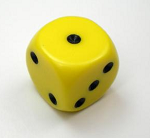|
Sanford posted:Stupid beginners question - how on earth do I work out attack bonuses for weapons in d&d 5e? Our rogue has been using a short sword, his character sheet says he gets +5 on attack rolls. But he’s just picked up a +1 dagger and wants to use that. So does he get +6 now? Or something different? When one of the fighters picked up a +1 longsword he was already using a longsword, so that was easy. Switching to a different weapon I don’t know how to work out. A more verbose explanation: Attack bonus is the total of best relevant ability modifier, applicable proficiency bonus, and any effects. Here, use the higher of his Dex or Str modifier. Dexterity is applicable instead of Str only because daggers and shortswords are finesse weapons- normally, only Str is used for melee attacks. If you're at levels 1 to 4, the proficiency bonus is +2. That bonus is only applied on weapons for which the character has proficiency. Rogues have proficiency in both daggers and shortswords, so that's unchanged. So, with a +1 weapon, the bonus should just be +6 total, unless his best Str/Dex modifer is higher than 3. It's best to go back and just do the math from scratch just to avoid compounding errors.
|
|
|
|

|
| # ? Jun 9, 2024 18:25 |
|
EvilElmo posted:Any resources you folks recommend for roll20? Free preferred for now, not sure if this is something I'll stick with or be able to find a decent playerbase in my time zone. If you're DMing just post in the LFG thread here/make a thread for the Roll20 recruitment. I got into a game that way and it's been aces.
|
|
|
|
Yay or nay on an idea to handle a setting's pantheon like this: Long ago, the Allcreator created the physical world for mortals and a bunch of pocket dimensions for minor gods to live in, then promptly hosed off to places unknown. In order to avoid said minor gods mucking up too much stuff that isn't theirs, there's a strict cap on how many holy visions/divine interventions/empowered champions etc one can have but it works like a carbon tax that can be traded internally so if Nelhysea the Maiden of War needs another warrior priest to be able to shoot divine lightning with their staff, she can trade with Hungruk, god of craftmen who's always in need of ways to communicate his intricate jewellery designs with his followers. This results in gods banding together into pantheons because why have everybody waste their divinity credits on setting up burning shrubbery when you can do it collectively and just have your chosen prophet preach polytheism. Another effect of this is that some gods trade away all their powers to affect the mortal realm for favours in the divine spheres such as an expanded demesne etc. and thus have no followers beyond a handful of wizards who bumbled into their domain through portal experimentations and are now just chilling there. In addition to this there are trickster gods who masquerade as multiple different gods or even whole pantheons, or some mortals could just be mad/liars when they founded their religion and thus not be praying to any existing deity(although aforementioned tricksters could encourage them for shits & giggles). In order to make the above actually apply to players beyond window dressing, "have a mortal do it" is a common workaround for getting more out of one's allotment of divine interventions. And yes, to avoid being /r/atheism, all cleric type players will be protected from their chosen religion being a complete fraud unless it's agreed upon out of the game, in which case they'll continue to smite baddies but do so with concentrated beams of their own moral principles.
|
|
|
Asehujiko posted:
Well, as long as you're not ruling out militant atheists out to destroy all the gods, I suppose.
|
|
|
|
|
What happens in the divine economy when gods of opposing traits ome into conflict? Like the bickering in the illiad for example?
|
|
|
|
Jack B Nimble posted:What happens in the divine economy when gods of opposing traits ome into conflict? Like the bickering in the illiad for example?
|
|
|
|
Asehujiko posted:A whole lot of back room deals, politicking and spurring on of mortal followers to screw over the other deity. So... the Iliad.
|
|
|
|
Thanks for the attack rolls clarification, much appreciated. There’s a couple more things I need advice with after today’s session. One simple, one not so simple. The simple one: I posted before about the players helping someone take over the town. Today they were trying to find out her plans, and when she asked “why should I tell you?” one of the players responded: “The more we know of your plans, the more we can help them come to fruition. We have already proven our loyalty; it is time for you to trust us as we have trusted you.” Now that’s a pretty good answer. I don’t still need to make him roll a persuasion check, do I? I didn’t, but all the players definitely thought I was going to. Now the more complex one. When we first started playing, I was pretty certain we were going to do a single session, maybe two, and nothing would matter story wise. That’s why one of the fighters is a nude, oiled Turkish wrestler, the NPC ranger Saldar Hallwinter is called Ronnie the Hog and rides a pig, and the first boss they killed was Wolf Off Gladiators rather than Klaarg the Bugbear. All these things came and went and have no bearing on where we are now. But when they first went well off track, and before I realised the benefit of having a couple of lines of background for anyone they might meet, they spoke with Daran Edermath, described in the book simply as “an adventurer”. In our version he used to lead an adventuring group called Henry’s Heroes that did good deeds “all around these parts”. My party found a woodcut showing the Heroes and naming them as Nikki Eyes (half elf), Sweet-Lips Hoolihan (halfling), Fingers McGraw (human) and the guy they’re talking to, who went by the name Henry Nipples. Each of the members of Henry’s Heroes had a magic item to match their name and my party have already found the Mask of Many Mouths (+ to performance checks) and the Chestplate of Many Nipples (healing item). Please realise I was making this up off the top of my head on the first or second time I ever played. Other maybe pertinent info: - when they asked Henry about his comrades, he got angry and said to never mention them again. - Henry is described as being well over a hundred years old, so there’s plenty of scope for something to have happened long ago. - it was maybe discussed that there was a dwarf member of Henry’s Heroes. Someone might have sung a song that went “the climbing dwarf, there he goes, see him climb with his monkey toes”. Finally and importantly, for some reason the party are really into this. When I asked them today to talk about what their characters wanted to do next, they named the main quest, a couple of hooks from the character sheets... and all agreed they want to find out what happened to Henry’s Heroes, and find the rest of their artefacts. So what do I do with this?
|
|
|
|
For your simple question: my personal opinion on social checks like that is that if the player comes up with something pretty convincing, as they did, and it's not weirdly OOC for them to do so (CHA 9), then you can let yourself be persuaded without having to trigger a roll. Rolls are for when something might be a stretch. It's your judgement call - just be careful not to let them get away with too much stuff. For your complicated question: congratulations and commiserations on getting the players really interested in a random aside that you now have to worldbuild. (Chestplate of Many Nipples, holy poo poo.) It honestly sounds like you've got a knack for this sort of thing - let it flow naturally, try not to force anything, Have Fun.
|
|
|
|
One thing I'd say is that you should also reward players who think up a good explanation but maybe can't articulate it very well as in-character dialogue. That way you're not punishing people who are inexperienced or don't feel confident with voicing out dialogue. You might just want to decrease difficulty sometimes instead of bypassing a check entirely as well. Also Henry's Heroes sounds like a great hook. I've had to do a similar thing running Cthulhu recently where they asked for background info for a character with about a line of sentence description and no name. Didn't turn out anywhere near as good, though.
|
|
|
|
My take on rolling for stuff is: you shouldn't roll unless something interesting will happen both if the players succeed and if they fail. With that social roll, I think "the person the players are working for is now suspicious they're trying to double-cross them and will be sending spies to watch what they're up to" is Interesting Stuff enough that a failure would be fun. So whether Halia lets the party in on stuff like that is down to his characterisation. If you're playing him as someone who's paranoid and cagey about his schemes, then it makes sense to ask the players to roll to winkle that information out. If he genuinely does respect the party, and doesn't think they're a dangerously unreliable band of murderhobos, it makes sense that they wouldn't roll, because they don't need to roll to persuade someone to do something they already want to. As for Henry's Heroes: Since Henry doesn't approve of what they're doing, it kinda sounds like something went down among them and some of them turned to the dark side and went their separate ways. Maybe that was just people changing over time, maybe it was power and wealth corrupting them, or maybe it was something more supernatural. I would figure out that first, and then the next time you find yourself writing an NPC who's up to no good, ask yourself: could I swap this out with one of the Heroes?
|
|
|
|
Whybird posted:maybe it was power and wealth corrupting them Henry's Heroes sold out to the man and became mercenaries who're only in it for the cold hard
|
|
|
|
Sanford posted:Please realise I was making this up off the top of my head on the first or second time I ever played. You're doing great. Sanford posted:I don’t still need to make him roll a persuasion check, do I? I didn’t, but all the players definitely thought I was going to. There's heaps of different ways to approach skills in D&D. Here's three of them: Some people play it like you did, and that's a good way to play - Do your roleplaying/description/etc, and if it sounds like it'd work, it just works. You can (and probably should) still roll if the result's in doubt or if there's significant external pressure (eg, if you're trying to do it while sword fighting, or if it'd normally take a minute or two and you're trying to do it in seconds). This is probably the most common way to do social interactions, but there's no reason it couldn't or shouldn't apply to other skill checks. Others like to do the descriptions/roleplay up front and then roll to see if it succeeded regardless of how the roleplay goes. I feel that this discourages roleplay or clever ideas because it doesn't matter what you came up with for your character to do, the result is always down to the roll. I like this way the least, but it's also pretty common. My favorite way, which is relatively uncommon in my experience, is (if the result's in doubt or if there's external pressure, and if failure would be interesting) to roll first and then roleplay/describe the result. I know it sounds backward, but it does two things. Firstly it encourages shy or awkward players (I know plenty of those) to attempt social things in-game that they might avoid if they had to roleplay just to have a chance at doing it. After the roll they have to provide something, but it needn't be an in-character dialogue, it can be as simple as "Francine the Bard sweet-talks the guards into letting us in. They're left feeling like they owe her a favor". Secondly, it encourages cool/awesome descriptions by discouraging players trying to hedge their bets in case of failure because they already know if they succeed or not. This is one of those things where you need to have a pre-game discussion about tone or you'll end up with "I convince the king to lend me his army by helicoptering my dick at him and winking". Or a lack of that, whichever would be a problem for that particular game. I usually go with a combination of the first and third ways. Want to roleplay before checking? That's cool, and if you come up with something that would obviously work, we won't roll. Want to roll first and then briefly describe the results? Also fine with me. Want to roll first and then do a 2 minute improv conversation that ends up matching the roll's result? I'm good with that too. The only thing I really don't like is "I'm gonna intimidate the bouncer. 16. He's intimidated." That kind of thing's fine in a game which has detailed social skills, but D&D isn't that game. To be clear here, I'd also rather not have "I climb the wall. 18. I'm up." or even "I climb the wall. 4. I don't get up." in a game. Describe what's going on, and I'll chip in as GM if necessary. Elector_Nerdlingen fucked around with this message at 00:10 on Nov 28, 2017 |
|
|
|
One thing you can do in a situation where you don't want to make someone roll (but where the party still expects it) is to just roll something yourself. You can roll insight or wisdom for the character they are convincing, without a contesting roll from your player. Or just roll to have a roll recorded. Don't tell them the result, then just go, "huh... okay..." and go into whatever NPC reaction you were already going to have to the player's argument. It's easy to over-use but a fun thing to throw some seeds of doubt into the party's mind.
|
|
|
|
re: "should I make them roll," my feeling has always been that you should only require a roll if it makes the game more interesting. Your player came up with a really good line; having that effort go away because they rolled a 3 doesn't make things more interesting, it makes them more boring; if you put in the effort to roleplay effectively and that effort gets negated by a die roll, then next time you're less likely to put in the effort, you know? If you still feel like rolling is more within the "spirit of the game" or whatever, though, that's okay. One thing I like to do when I'm GMing is, in a situation like that, roll for magnitude rather than result. That is to say, the player came up with a good angle, and I want to reward that creativity by making them succeed, but I'll have them roll anyways to see how well they succeed. So in the example you gave, Sanford, maybe a failed Persuasion check just means she'll tell them what they want to know, but 'trusting them' isn't on the agenda yet, whereas a really good roll means she actually will trust them as they've (supposedly) trusted her. As long as you're rewarding creativity and effort, which is - IMHO - the important part.
|
|
|
|
Sanford posted:So what do I do with this?
|
|
|
|
As to whether or not you roll, I'll throw one other option at you: You also have the option to both roll-play and role-play. By this I mean, sure, you can call for a roll - but have that roll be modified by the outstanding role-playing your PC has already turned in. Understand that this modifier is totally arbitrary, but you can use it to reward players for getting into character and being clever. Similarly, you can go the opposite way too - roll first, then have the results modify the NPC's further interaction with the PC. So if the player flubs the initial roll, maybe the NPC thinks they an idiot or a liar or misinterprets their intentions or whatever. The important part in this is for there to be some feedback, a way for a player with good role-playing skills to overcome a bad roll and a way for a player who is less adept at role-playing take advantage of their character's skills to come off as more glib, cunning, charming, or whatever than they are in real life.
|
|
|
|
Sanford posted:Thanks for the attack rolls clarification, much appreciated. There’s a couple more things I need advice with after today’s session. One simple, one not so simple. If you feel comfortable ad-libbing responses, another option you can go with for that kind of roll would be to say "Ok, she buys it; roll to see how much she trusts you with." And then depending on how well they roll you reveal more or less, but the lie always succeeds to some degree.
|
|
|
|
Pleads posted:One thing you can do in a situation where you don't want to make someone roll (but where the party still expects it) is to just roll something yourself. You can roll insight or wisdom for the character they are convincing, without a contesting roll from your player. Or just roll to have a roll recorded. Ugh this is the worst in my opinion, it can lead to paranoid players always choosing the safest route. If anyone is rolling the gm should be clear on what the roll means in terms of failure, success and difficulty.
|
|
|
|
Sanford posted:“The more we know of your plans, the more we can help them come to fruition. We have already proven our loyalty; it is time for you to trust us as we have trusted you.” e: such as, she knows there's a spy and has been feeding him false information. She could take the PCs to a private conversation, but the spy gets suspicious and follows them. Now the PCs have to stop him before he takes the real info to his masters. Or the leader sighs, gives them the info, then kills the spy and explains "that guy was a spy, still useful to me as long as I could keep the whole plan from him, but, well, congrats, you get to do his job now." quote:“the climbing dwarf, there he goes, see him climb with his monkey toes” My Lovely Horse fucked around with this message at 11:14 on Nov 28, 2017 |
|
|
|
Elfgames posted:If anyone is rolling the gm should be clear on what the roll means in terms of failure, success and difficulty. Totally agree. Stakes should be clear before rolling. Difficulty should be clear before rolling. If anyone's unclear about stakes or difficulty, it's time for an OOC chat about what exactly is being rolled for. Relatedly, if something's supposed to be impossible, then just say so rather than setting what you think is an impossible DC. I'm not a fan of telling the players "no", but I'm 100% on board with "not like that", "not yet", or "not without a siege engine".
|
|
|
|
Sanford posted:Today they were trying to find out her plans, and when she asked “why should I tell you?” I think the answer to the "should the player roll here" in this instance depends on why the NPC asked this question first. Did she ask because she was paranoid and thought the players were about to betray her? If so, there's an interesting result either way right there - a success assuages her fears and worries and leads to mutual benefit in both the short and long term. A failure still leads to the players being given information for something they could help with... but it's fake information. Send 'em out to do something that she'd think would be a deathtrap or whatever.
|
|
|
|
I think you were totally right to wave the roll, cos that is a very convincing argument, and as long as the NPC isn't legit against them (or just a paranoid nutcase) there'd be little reason for them to deny such strong logic More stuff to think about though for future encounters (have you realised that social encounters are somewhat arbitrary and difficult to model yet?) I once read this interesting mechanic, which I've never got to try, where you flip the way the roll works. So you have your player say their thing, they roll, then you apply the outcome of the roll as a modifier to how convincing you thought their argument was For example, let's say in your scenario the NPC is friendly and open to the suggestion of sharing her plans, when your player stated that very sensible argument, you roll anyway, but even on a failure (not a crit fail) they still pass because their argument was drat good. If they pass by a lot or crit, then maybe they get something else out of it, or the NPC takes a particular liking to them Likewise, if your players are in a neutral situation, you ask them to make and argument and you think it's pretty weak, they roll then maybe on a low pass they still fail, but if they crit you'd be like "something about you she likes, you catch her eyes looking at the flower you wear on your breast as you talk, and she accepts your proposal" People are complicated, and I guess that method kinda helps to model that? On the other hand I kinda hate it because it means that players who are weaker at roleplay (or are just coming up with convincing arguments) get totally bowled over by the IRL fast talkers in the group. It also really sucks for other players if someone has a character who's poo poo at charisma, but can talk their way out of stuff (or vice versa) Which is a good question to ask yourself too, do you want the social interactions to be about how good the characters are or how good the players are? If you can answer that, then picking a method of dealing with social encounter should be easy, if you can't then maybe ask your players for what they'd like to model. Just be careful that you don't alienate the quieter players by letting the loud/good charisma players abuse it ninja edit: FWIW I personally tend to hand wave a lot of social checks and make personal decisions based on what the player is saying and what the NPC is like. Unless there's a particularly interesting set of outcomes which a roll could help decide. Most of the time I just let my players talk themselves out/into things and have NPCs react as I think they should VVV If the players are keen about it, shutting it down is a generally bad plan, they'll always be curious and feel like they've been shut down by you. You're better embracing it and adapting/backburning existing plans. Remember you can always use that epic quest line you thought about in the next game with a reskin. Or find a way to tie the new quest line into the existing one to make it better kaffo fucked around with this message at 10:49 on Nov 29, 2017 |
|
|
|
Very helpful insight into different ways of doing non-combat rolls, thanks guys. Luckily my players recognise I am as new to this as them and don't care/notice if I try multiple different approaches until we find one that works. As for the other matter, oy, I was hoping you'd tell me a tried and tested method for shutting down a storyline you don't know what to do with. I guess I'll start laying some hints around as to what happened to Henry's Heroes - I've already said that there's no wyverns at Wyvern's Tor since they were driven out decades ago, so maybe they did that. And the dwarf member betrayed them in some way and the party broke up? I'm in too deep! VVV Good idea. Turkish wrestler needs a plot hook; I'll throw it his way. VVV Sanford fucked around with this message at 11:41 on Nov 29, 2017 |
|
|
|
Ask your players.
|
|
|
|
Sanford posted:I was hoping you'd tell me a tried and tested method for shutting down a storyline you don't know what to do with DON'T It's perfectly fine to say, out of character, to the players "I don't have anything for X prepared yet because I thought you'd be doing Y or Z first. Would you guys be cool to do one of those things this week and I'll write up some stuff for X by the time you've finished that?" You might add "...or I guess I can try to ad-lib for now and fill in the details later" if you're comfortable with that.
|
|
|
|
Sanford posted:VVV Good idea. Turkish wrestler needs a plot hook; I'll throw it his way. VVV
|
|
|
|
My Lovely Horse posted:Just checking, you do try and find a way for this guy to use weapon oils for unarmed attacks, right? "It works like the great axe listed on your sheet but if you describe it as a wrestling move you get advantage" is working for us so far. His armour is described simply as "glistening pecs" and once a day he can summon a folding chair and hit someone with it. He needs plot hooks because his personal goal as written is to conquer Cyprus and then reinstate the Ottoman Empire. AlphaDog posted:DON'T There's too much! They want to get into everything. Last session they spent thirty minutes interrogating a goblin to "see what he knows". He knows nothing! I'm making it up as we go along! They still think I'm reading it out of the book and it is 99% random poo poo I am making up on the spot because they keep getting interested in the wrong things.
|
|
|
|
Sanford posted:There's too much! They want to get into everything. Last session they spent thirty minutes interrogating a goblin to "see what he knows". He knows nothing! I'm making it up as we go along! They still think I'm reading it out of the book and it is 99% random poo poo I am making up on the spot because they keep getting interested in the wrong things. Congratulations! You know why your players are getting interested in the wrong things? Because you made them interesting. And that's cool, because you're not beholden to the book or anything. If the PCs want to ignore that stuff and go enjoy the crazier poo poo you've been ad-libbing, why not set the book aside and ad-lib all of it? Okay, that might be a bit much. But still, the problem you're having is that your players are actually interested in the poo poo you're coming up with, and that ain't a bad problem to have.
|
|
|
|
The best part of DMing for me is to take all the poo poo we established and tie it together in surprising ways.
|
|
|
|
Sanford posted:There's too much! They want to get into everything. Last session they spent thirty minutes interrogating a goblin to "see what he knows". He knows nothing! I'm making it up as we go along! They still think I'm reading it out of the book and it is 99% random poo poo I am making up on the spot because they keep getting interested in the wrong things. Echoing here that your players aren't getting interested in the "wrong things" they're just getting interested in things that interest them. You need to tie it together, that goblin who knows nothing, if your players are that invested in getting info out of him then BOOM he suddenly knows something! Even better he was hired by that bandit camp you've been trying to get your players to investigate for the last 2 sessions without success! Let your players guide the game but tie it all in and guide the players to the stuff you've prepared in an organic way.
|
|
|
|
E: Took a while posting this, and the previous three posters have really good points so I've deleted that part of this post. I also understand that it can feel like that's just way too much to do and I tried to address that too, so I didn't delete that part. Sanford posted:There's too much! They want to get into everything. Last session they spent thirty minutes interrogating a goblin to "see what he knows". He knows nothing! I'm making it up as we go along! They still think I'm reading it out of the book and it is 99% random poo poo I am making up on the spot because they keep getting interested in the wrong things. Get your players on board with the idea of out-of-character communication about the game, the direction it's going in, and that you're adding and subtracting stuff from the published adventure. Literally just be honest with them and tell them what's going on. Let them know that the book you're playing from has some detailed stuff that's the "expected path" and a whole lot of undetailed stuff that's secondary or tertiary. They should understand that sometimes you're gonna have to say "If you go in this direction, none of this is in the book. I'm gonna need < 5 minutes / half an hour / my spare time for several days> to pull some poo poo together for you", or even "hey, taking off my DM hat for a second, this goblin has nothing, you're wasting your time". Nobody should have a problem with that if they understand that you're not just reading it out of the book as if they were playing a co-op computer game with you in place of the computer. In that same vein, you can (I don't really like it, but it's perfectly reasonable for a published adventure) tell the players out-of-character that they're going significantly off-plot and the story is that way. Likewise, they should feel able to tell you that they're not enjoying the pre-written parts and they'd rather go off in a different direction, in which case you can all talk about what you want out of the game and how you're going to get it. Elector_Nerdlingen fucked around with this message at 13:33 on Nov 29, 2017 |
|
|
|
Apropos of nothing, your game seems really cool and it's great that your players are so invested.
|
|
|
|
My Lovely Horse posted:The best part of DMing for me is to take all the poo poo we established and tie it together in surprising ways. Same but actually it's the players going "oh poo poo does that mean X was doing Y all along?" from some old thread I forgot about but suddenly I look like a mastermind. My players also used to try and interrogate the plot out of everything they met. Eventually I just started telling them as the DM that they weren't getting anything out of their prey to cut the scenes short. It can really drag on, especially if your muderhobos think they just need to torture HARDER to get the info.
|
|
|
|
AlphaDog posted:Get your players on board with the idea of out-of-character communication about the game, the direction it's going in, and that you're adding and subtracting stuff from the published adventure. It's entirely reasonable for you, as the GM, to balk because something it isn't fun for you. One of the inherent problems with D&D and other "old school" GM heavy games is it puts a massively disproportionate amount on one player's shoulders - to the point the entire terminology is warped so that "player" is usually everyone except the GM. It's easy to forget that the GM is supposed to be having fun too, rather than playing host to someone else's good time (well, unless you've contrived to get paid for it somehow). The antidote to that is to get the other players used to you talking out of character to establish boundaries and conditions and comment on the state of the campaign, so that you can avoid wasting time or stress.
|
|
|
|
Pleads posted:Same but actually it's the players going "oh poo poo does that mean X was doing Y all along?" from some old thread I forgot about but suddenly I look like a mastermind. Do you guys ever run with the real world comparison where people who are being tortured will literally confess to anything in order to get it to stop?
|
|
|
|
AceClown posted:Do you guys ever run with the real world comparison where people who are being tortured will literally confess to anything in order to get it to stop? That definitely came up but then they just went off chasing the bullshit leads that resulted (so I had to come up with dumb things on the fly) or successfully insight-checked it as bullshit and pressed harder for the truth. Next game I run I'm going to put more checks and balances in place to prevent them from going so far murderhobo.
|
|
|
|
AceClown posted:Do you guys ever run with the real world comparison where people who are being tortured will literally confess to anything in order to get it to stop?
|
|
|
|
Thanks again everyone, apologies for monopolising the thread but this is very useful and reassuring - I'm still having a blast but not sure if I'm doing it right, and if that might cause us problems later. I think one of the biggest issues with them going off-piste is that the plot hooks as written in the book are boring. We had a Skype catch-up today to talk about what's going on (and so I could ask them to head for one of the routes I have fully prepped, not one straight out the book), and one of the players said "tell me again exactly why I should give a gently caress about this dwarf?" The dwarf is literally the main plot thread of the whole adventure. They're now discussing ways they could find out the info they need from the dwarf without rescuing him, because anyone stupid enough to get captured by gerblins probably deserves it. I just know they're going to try and torture the fortune-telling banshee...
|
|
|
|

|
| # ? Jun 9, 2024 18:25 |
|
Sanford posted:Thanks again everyone, apologies for monopolising the thread but this is very useful and reassuring - I'm still having a blast but not sure if I'm doing it right, and if that might cause us problems later. On the other hand, it's entirely fair to have the answer be "you don't care about the dwarf, just the info he has" and if they can find a way to get that info elsewhere, go with it. If not, remind them the dwarf also knows they don't give a gently caress about him and will quite reasonably withhold that info until rescued.
|
|
|








































